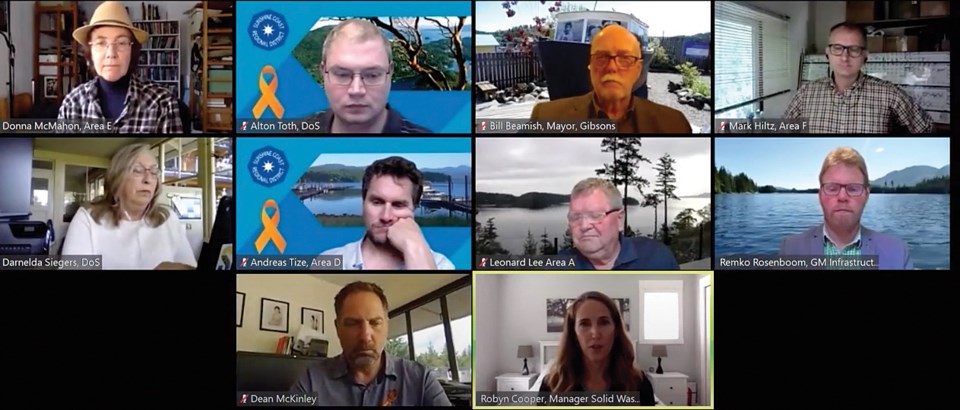Local governments on the Sunshine Coast say they are beginning to plan a return to in-person meetings now that Step 2 of B.C.’s restart plan is in effect, which according to the province, “allows for in-person attendance at council or board meetings.”
Indoor seated gatherings with up to 50 people are permitted as of June 15, though attendees must wear masks. In the context of local government meetings, that maximum would include elected officials, staff, and members of the public, said a provincial guidance document issued June 17.
The document said local governments should start planning “and making best efforts to transition to limited in-person public attendance at in-person public hearings, council meetings and board meetings.”
“The current PHO Order on Gatherings and Events allows for in-person public attendance at council or board meetings,” said the document, which noted the transition “will depend on the unique circumstances in each community.”
District of Sechelt communications manager Julie Rogers said council will be discussing the issue in July and the district “will continue to follow the Provincial requirements for masks, distancing, gathering and safety plans.”
Gibsons council will be “continuing with electronic meetings for the foreseeable future,” said communications coordinator Elizabeth Quayle, though the town anticipants a return to in-person meetings “in the next few months and are starting to prepare for that day.”
The town cited occupancy limits in Step 2 of the restart plan for why meetings will continue to be held virtually.
Sunshine Coast Regional District (SCRD) communications manager Aidan Buckley told Coast Reporter via email the regional district is “very much in a planning phase right now,” as it updates its COVID safety plan.
“At this time, we do not have a timeline to welcome the public back to the SCRD for public meetings,” he said, adding a timeline is expected “in the coming weeks” for “everything from extending hours at our administration buildings to when we expect to return to in-person meetings.
“We have been thankful for the support of residents throughout the COVID-19 pandemic and we ask that this support continues as we begin taking steps forward in reopening safely.”
As for School District No. 46, outgoing superintendent Patrick Bocking said the board hopes to return to in-person meetings in the new school year with an anticipated “hybrid” approach.
“As we emerge from the pandemic with fewer restrictions, we anticipate finding ways to support hybrid approaches to communication. This may mean in-person meetings with options to join in via audio/video links,” he said, noting also that “meeting together is always best.”
Coast Reporter reached out to shíshálh Nation but did not receive a response in time for deadline.
Virtual public meetings have been lawful since March 2020 thanks to an Emergency Program Act order (M192), which expires 90 days after the province’s state of emergency is lifted.
The June 17 guidance document indicated “based on the information and data outlined in the restart plan, local governments will want to prepare for the end of the state of emergency.”
However, with amendments to the Municipal Affairs Statues Amendments Act, made earlier this spring, local governments have been given the continued authority to hold meetings electronically – though the changes have yet to be brought into force and procedure bylaws can’t be adopted until the legislation is implemented.
The amendments were made to allow local governments to provide transition and continuity once the Emergency Program Act order M192 expires and “provide greater flexibility for local governments and the Province to respond to future extraordinary circumstances,” according to a separate provincial memo about the changes.
In May, the provincial government passed similar legislation to allow B.C. businesses, societies, credit unions and other associations to hold meetings virtually on a permanent basis.



